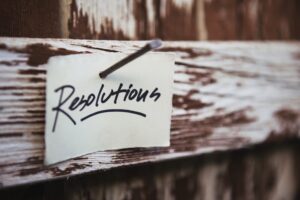 How’s your New Year’s Resolution going? Is it getting harder to keep? Starting to slide just a little? Set aside completely ? Research has shown that only a tiny percentage of New Year’s Resolutions actually result in long term significant change.
How’s your New Year’s Resolution going? Is it getting harder to keep? Starting to slide just a little? Set aside completely ? Research has shown that only a tiny percentage of New Year’s Resolutions actually result in long term significant change.
Why is it that genuine commitments to change behavior so often fall by the wayside? Is it really all about willpower? We see an opportunity for positive change, declare commitment with the best of intentions, and often end up being disappointed in ourselves when we fall back on old behaviors. Brené Brown says to make a New Year’s Resolution if you want to be swimming in shame by January 20th!
I had a long walk along the water today listening for the second time to a Dare to Lead podcast with Brené Brown and Lisa Lahey. I don’t listen to podcasts more than once, but this one got my attention!
I first learned of Lisa Lahey’s work around 13 years ago when I read Immunity to Change, the book she co-authored with Robert Kegan. My copy is well worn and highlighted. We worked with the material in our Leadership and Legacy retreat in 2010 and will revisit it this July. The insights and information of that work continue to have a profound influence on my thinking and my work all these years later.
Listening to the podcast has moved my understanding of change to another level.
I had to listen to it twice.
I was struck by the realization that culturally we have only one model for change: The Willpower Model. We believe that if something is important enough to us we will change our behavior. If we fail to change our behavior we tend to think that either we did not care enough or were not strong enough to affect the change. We judge ourselves and others as lacking. While simple issues often respond well to will power, significant change is more complex and may require a deeper dive into what gets in our way.
From a leadership perspective, as well as a personal perspective, that model is not only inadequate, but also harmful. It leads to disappointment and shame, and very little learning. Kegan and Lahey’s work focuses instead on a change of mindset prior to a change in behavior. “Immunity to Change” refers to a missing piece in our understanding of the process of change. Our failure to make the changes comes not from insincerity, but from a failure to fully realize the complexity of the change to which we aspire. If we can slow down our process and resist our bias for action, we can learn to clarify not just the goals we have articulated, but also hidden competing goals.
Walking through the Immunity to Change “map” can also lead us to uncover “big assumptions” we hold. Those assumptions sometimes reveal a conflict we perceive between two things we hold dear. We think we must choose between the two, but often we discover it’s possible to have both. When we question our big assumptions we can create ways to safely test them and learn from the process.
If these concepts are new to you, I urge you to listen to this podcast. If they are not new to you, I urge you to listen to this podcast. Because in this two-part podcast, in real time, Lisa Lahey leads Brené Brown through an authentic process of discovering her own “immunity to change.” It is not easy for Brené. It is powerful. And it is a master class in how to facilitate change for someone who is stuck.
You just might want to listen to it twice!

Leave a Reply